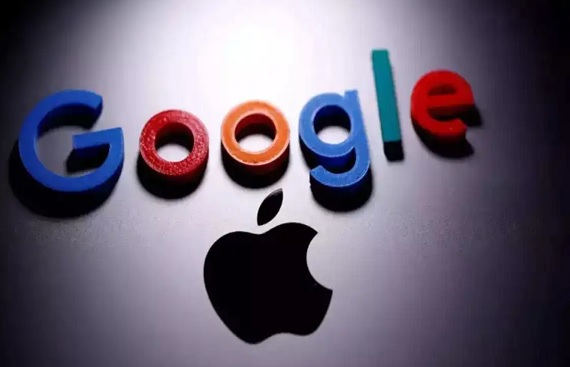Apple's AI-Powered Search Plans Threaten Google's Search Dominance
By
siliconindia | Thursday, 08 May 2025, 01:44 Hrs

- Apple plans to introduce AI-driven search options in Safari, posing a significant challenge to Google’s search dominance.
- Google’s $20 billion annual payment to Apple for default search engine status on Safari could be jeopardized, threatening its search advertising income.
- AI-powered search platforms like ChatGPT and Perplexity AI are gaining traction, intensifying competition for Google in the search market.
Apple's plan to add AI-based search options to its Safari web browser has sent the tech world reeling, with implications of a possible threat to Google's long-standing supremacy in internet search. This development could redefine the competitive scenario, particularly since Google's heavy dependence on iPhone users for its search business has powered its highly profitable model of advertising.
The announcement triggered a sudden drop in Alphabet, the parent company of Google, whose stock price plunged 7.3% within one day, translating to a loss of around $150 billion in market value. The fall serves to illustrate the possible effect that Apple's change could have on the financial future of the search engine giant. Apple has been looking into how to revamp Safari, with plans to add AI search functions, according to a person familiar with the situation. Apple executive Eddy Cue, who testified in an antitrust case over Google's control of the online search market, said that Safari searches had seen a decline for the first time last month. This decline in search activity is also due to users switching increasingly towards AI-driven search tools.
Although affecting its stock, Apple's own stock also fell slightly by 1.1% after the news, with investors taking time to process the possible implications of this trend. Meanwhile, Google countered with the move of minimizing concerns by claiming that it is still experiencing overall search query growth, even those coming from Apple's devices and platforms. In a blog post, Google highlighted that its search engine continues to be the users' first choice for finding relevant information, partly due to its advancements in voice and visual search functionality, which have helped drive an increase in total search volume.
But the potential threat of AI-driven alternatives stealing market share from Google cannot be overlooked. Apple's foray into AI-enabled search could represent a major challenge to Google, which has maintained an almost monopoly hold on the search market for several years. With the U.S. Justice Department ongoing antitrust probes of Google, investigating mechanisms to break it up, pressure on Google to innovate and react to developing threats is intensifying.
Today, Google continues to be the default search engine on Apple's Safari web browser, an extremely desirable placement. Google is believed to pay Apple around $20 billion every year for the right, roughly 36% of Google's search ad business taken from the Safari browser. This relationship has been instrumental for Google's enterprise, but the current talks indicate the exclusive agreement may be endangered. Regulators of antitrust, especially those in the United States, suggested that Google must be prohibited from paying for default search position, and this action may upset Google's search ads revenue model based on search positioning.
D.A. Davidson analyst Gil Luria cautioned that losing the exclusivity of being the default search engine on Apple devices would have disastrous implications for Google. Luria pointed out that most advertisers already spend most of their search advertising budgets on Google because of its commanding market share. But the emergence of alternative search engines might lead advertisers to spread their ad spending, which would undermine Google's dominance in the market.
Google does have defenses, though. While criticized early on for its late reaction to AI innovation after ChatGPT launched in the latter part of 2022, Google has recently accelerated its AI initiatives. The search firm has made significant investments in AI technology and used its vast stores of data to remain competitive. In February, Google added an 'AI mode' to its search page, aimed at keeping users from switching to other AI models. Google has also rolled out its AI Overviews feature, which gives summaries above regular search results, and added ads in the overviews, contributing to a lift in its search ad revenue.
In a bid to remain competitive, Google has reportedly been in talks with Apple regarding a possible deal that would see its Gemini AI technology included in upcoming iPhones. Apple's Cue also confirmed that the firm will offer AI search providers, including OpenAI and Perplexity AI, as alternatives within the Safari browser. The act shows Apple is willing to go further in seeking new AI-based search alternatives, providing users with a choice outside conventional search engines like Google.
Yory Wurmser, principal analyst for advertising, media, and technology at eMarketer, explained that Apple's plans herald a change in the game of generative search technologies. Wurmser pointed to increasing significance of platforms such as ChatGPT and Perplexity, which quickly gained popularity as a source of alternate search. For example, ChatGPT recently announced more than 1 billion weekly web searches, with over 400 million active users as of February 2024. This expansion highlights the possibility of AI search technologies to upend the existing order and draw a significant proportion of search traffic away from Google.
Google's willingness to pay billions of dollars to maintain its default position on Apple’s devices demonstrates how crucial these agreements are to its business. However, as AI-powered search engines continue to evolve, Google will face increasing competition from companies like Apple and emerging AI platforms, potentially changing the dynamics of online search forever. The future of the search industry seems poised for change, and only time will reveal how Google responds to these new challenges.
